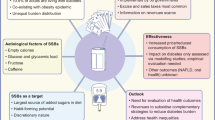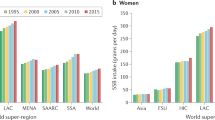Abstract
Purpose of Review
Global sugar-sweetened beverage (SSB) consumption is high, with important implications for cardiovascular health. International momentum with the adoption and implementation of SSB taxes has been mounting in recent years, as has the evidence supporting such a policy for population health. In this review, we summarise the influence of regular SSB consumption on cardiovascular health and provide a global perspective on SSB consumption and SSB tax action and evidence. We further discuss the might and organised opposition of the beverage industry and the policy enablers for affirmative action.
Recent Findings
Compelling evidence demonstrates a link between regular SSB consumption and adverse cardiovascular health. Although global SSB consumption appears to be declining slightly, consumption remains high. Forty-five jurisdictions around the world have now implemented a notable tax on SSBs and consistent evidence demonstrates the effectiveness of this policy at reducing the purchase or consumption of SSBs at the population level. However, the political influence of industry remains a major barrier to further action. Enablers to policy action include the realisation of the revenue-raising potential of taxes, evidence base advocacy framing from trusted sources, broad-based advocacy coalitions and the communication of clear policy objectives.
Summary
SSB taxes represent a promising strategy, alongside a broader comprehensive approach, for improving population diets and cardiovascular health, but face stiff industry opposition. Future research must focus on the influence of different SSB tax designs and context on population diet and health.


Similar content being viewed by others
References
Papers of particular interest, published recently, have been highlighted as: • Of importance •• Of major importance
Forouzanfar MH, Alexander L, Anderson HR, Bachman VF, Biryukov S, Brauer M, et al. Global, regional, and national comparative risk assessment of 79 behavioural, environmental and occupational, and metabolic risks or clusters of risks in 188 countries, 1990-2013: a systematic analysis for the Global Burden of Disease Study 2013. Lancet. 2015;386(10010):2287–323.
McKinsey Global Institute. Overcoming obesity: An initial economic analysis. 2018.
Te Morenga L, Mallard S, Mann J. Dietary sugars and body weight: systematic review and meta-analyses of randomised controlled trials and cohort studies. BMJ. 2012;346:e7492.
Malik VS, Popkin BM, Bray GA, Despres JP, Willett WC, Hu FB. Sugar-sweetened beverages and risk of metabolic syndrome and type 2 diabetes: a meta-analysis. Diabetes Care. 2010;33(11):2477–83.
Australian Bureau of Statistics. Australian Health Survey: Consumption of Added Sugars 2011–12 Report No.4363.0.55.011. Canberra, Australia; 2016.
Australian Institute of Health and Welfare. Australia’s health no. 15. Cat. no. AUS 199. Canberra; 2016.
Pan A, Hu FB. Effects of carbohydrates on satiety: differences between liquid and solid food. Curr Opin Clin Nutr Metab Care. 2011;14(4):385–90.
Ventura AK, Mennella JA. Innate and learned preferences for sweet taste during childhood. Curr Opin Clin Nutr Metab Care. 2011;14(4):379–84.
Fung TT, Malik V, Rexrode KM, Manson JE, Willett WC, Hu FB. Sweetened beverage consumption and risk of coronary heart disease in women. Am J Clin Nutr. 2009;89(4):1037–42.
de Koning L, Malik VS, Kellogg MD, Rimm EB, Willett WC, Hu FB. Sweetened beverage consumption, incident coronary heart disease, and biomarkers of risk in men. Circulation. 2012;125(14):1735–41 S1.
Bray GA, Popkin BM. Calorie-sweetened beverages and fructose: what have we learned 10 years later. Pediatr Obes. 2013;8(4):242–8.
Welsh JA, Sharma A, Abramson JL, Vaccarino V, Gillespie C, Vos MB. Caloric sweetener consumption and dyslipidemia among US adults. JAMA. 2010;303(15):1490–7.
Chen L, Caballero B, Mitchell DC, Loria C, Lin PH, Champagne CM, et al. Reducing consumption of sugar-sweetened beverages is associated with reduced blood pressure: a prospective study among United States adults. Circulation. 2010;121(22):2398–406.
Singh GM, Micha R, Khatibzadeh S, Lim S, Ezzati M, Mozaffarian D, et al. Estimated global, regional, and national disease burdens related to sugar-sweetened beverage consumption in 2010. Circulation. 2015;132(8):639–66.
Malik VS, Popkin BM, Bray GA, Despres JP, Hu FB. Sugar-sweetened beverages, obesity, type 2 diabetes mellitus, and cardiovascular disease risk. Circulation. 2010;121(11):1356–64.
Varsamis P, Formosa MF, Larsen RN, Reddy-Luthmoodoo M, Jennings GL, Cohen ND, et al. Between-meal sucrose-sweetened beverage consumption impairs glycaemia and lipid metabolism during prolonged sitting: a randomized controlled trial. Clin Nutr. 2018.
Johnson RK, Appel LJ, Brands M, Howard BV, Lefevre M, Lustig RH, et al. Dietary sugars intake and cardiovascular health: a scientific statement from the American Heart Association. Circulation. 2009;120(11):1011–20.
Australian Heart Foundation. Healthy drinks [Available from: https://www.heartfoundation.org.au/healthy-eating/food-and-nutrition/drinks.
Foundation BH. [Available from: https://www.bhf.org.uk/heart-health/preventing-heart-disease/healthy-eating/sugar
Mytton OT, Clarke D, Rayner M. Taxing unhealthy food and drinks to improve health. BMJ. 2012;344:e2931.
• Backholer K, Blake M, Vandevijvere S. Have we reached a tipping point for sugar-sweetened beverage taxes? Public Health Nutr. 2016;19(17):3057–61 Summary of action and evidence relating to SSB taxes throughout 2017.
Responsibility OfB. Economic and fiscal outlook. United Kingdom; 2017.
•• Colchero MA, Popkin BM, Rivera JA, Ng SW. Beverage purchases from stores in Mexico under the excise tax on sugar sweetened beverages: observational study. BMJ. 2016;352:h6704 First real-world evaluations of SSB taxes, demonstrating significant post implementation declines in SSB sales in Mexico, the city of Berkeley (CA, USA), and Chile respectively.
Colchero MA, Rivera-Dommarco J, Popkin BM, Ng SW. In Mexico, evidence of sustained consumer response two years after implementing a sugar-sweetened beverage tax. Health Aff (Millwood). 2017;36(3):564–71.
•• Falbe J, Thompson HR, Becker CM, Rojas N, McCulloch CE, Madsen KA. Impact of the Berkeley excise tax on sugar-sweetened beverage consumption. Am J Public Health. 2016;106:e1–7 First real-world evaluations of SSB taxes, demonstrating significant post implementation declines in SSB sales in Mexico, the city of Berkeley (CA, USA), and Chile respectively.
•• Nakamura R, Mirelman AJ, Cuadrado C, Silva-Illanes N, Dunstan J, Suhrcke M. Evaluating the 2014 sugar-sweetened beverage tax in Chile: an observational study in urban areas. PLoS Med. 2018;15(7):e1002596 First real-world evaluations of SSB taxes, demonstrating significant post implementation declines in SSB sales in Mexico, the city of Berkeley (CA, USA), and Chile respectively.
Zhong Y, Auchincloss AH, Lee BK, Kanter GP. The short-term impacts of the Philadelphia beverage tax on beverage consumption. Am J Prev Med. 2018;55(1):26–34.
Blake MR, Lancsar E, Peeters A, Backholer K. The effect of sugar-sweetened beverage price increases and educational messages on beverage purchasing behavior among adults. Appetite. 2018;126:156–62.
Waterlander WE, Ni Mhurchu C, Steenhuis IH. Effects of a price increase on purchases of sugar sweetened beverages. Results from a randomized controlled trial. Appetite. 2014;78:32–9.
Backholer K, Sarink D, Beauchamp A, Keating C, Loh V, Ball K, et al. The impact of a tax on sugar-sweetened beverages according to socio-economic position: a systematic review of the evidence. Public Health Nutr. 2016;19(17):3070–84.
Lal A, Mantilla-Herrera AM, Veerman L, Backholer K, Sacks G, Moodie M, et al. Modelled health benefits of a sugar-sweetened beverage tax across different socioeconomic groups in Australia: a cost-effectiveness and equity analysis. PLoS Med. 2017;14(6):e1002326.
Centre for science in the public interest. Big Soda vs. Public Health (2016 Edition). 2016.
Bes-Rastrollo M, Schulze MB, Ruiz-Canela M, Martinez-Gonzalez MA. Financial conflicts of interest and reporting bias regarding the association between sugar-sweetened beverages and weight gain: a systematic review of systematic reviews. PLoS Med. 2013;10(12):e1001578; dicsussion e.
Council AB. Australian Beverages 2016 Annual report. Waterloo, New South Wales; 2017.
California legislative information. Assembly Bill No. 1838, Chapter 61. California; June 28, 2018.
Hagenaars LL, Jeurissen PPT, Klazinga NS. The taxation of unhealthy energy-dense foods (EDFs) and sugar-sweetened beverages (SSBs): an overview of patterns observed in the policy content and policy context of 13 case studies. Health Policy. 2017;121(8):887–94.
Magnusson RS, Patterson D. The role of law and governance reform in the global response to non-communicable diseases. Glob Health. 2014;10(1):44.
Donaldson E. Advocating for sugar-sweetened beverage taxation: a case study of Mexico: John Hopkins Bloomberg School of Public Health; 2017.
Wright A, Smith KE, Hellowell M. Policy lessons from health taxes: a systematic review of empirical studies. BMC Public Health. 2017;17(1):583.
Jou J, Niederdeppe J, Barry CL, Gollust SE. Strategic messaging to promote taxation of sugar-sweetened beverages: lessons from recent political campaigns. J Inf Secur. 2014;104(5):847–53.
Thow AM, Quested C, Juventin L, Kun R, Khan AN, Swinburn B. Taxing soft drinks in the Pacific: implementation lessons for improving health. Health Promot Int. 2011;26(1):55–64.
World Health Organization Regional Office for Europe. Using pricing policies to promote healthy diets. Copenhagen 2015.
Bonilla-Chacín ME, Iglesias R, Suaya A, Trezza C, Macías C. Learning from the Mexican experience with taxes on sugar-sweetened beverages and energy-dense foods of low nutritional value. Washington D.C.: World Bank; 2016.
Baker P, Jones A, Thow AM. Accelerating the Worldwide Adoption of Sugar-Sweetened Beverage Taxes: Strengthening Commitment and Capacity; Comment on “The Untapped Power of Soda Taxes: Incentivizing Consumers, Generating Revenue, and Altering Corporate Behavior”. International Journal of Health Policy and Management. 2017.
Author information
Authors and Affiliations
Corresponding author
Ethics declarations
Conflict of Interest
Kathryn Backholer and Phillip Baker declare that they have no conflict of interest. This article does not contain any studies with human or animal subjects performed by any of the authors.
Human and Animal Rights and Informed Consent
This article does not contain any studies with human or animal subjects performed by any of the authors.
Additional information
This article is part of the Topical Collection on Cardiovascular Risk Health Policy
Rights and permissions
About this article
Cite this article
Backholer, K., Baker, P. Sugar-Sweetened Beverage Taxes: the Potential for Cardiovascular Health. Curr Cardiovasc Risk Rep 12, 28 (2018). https://doi.org/10.1007/s12170-018-0593-6
Published:
DOI: https://doi.org/10.1007/s12170-018-0593-6




